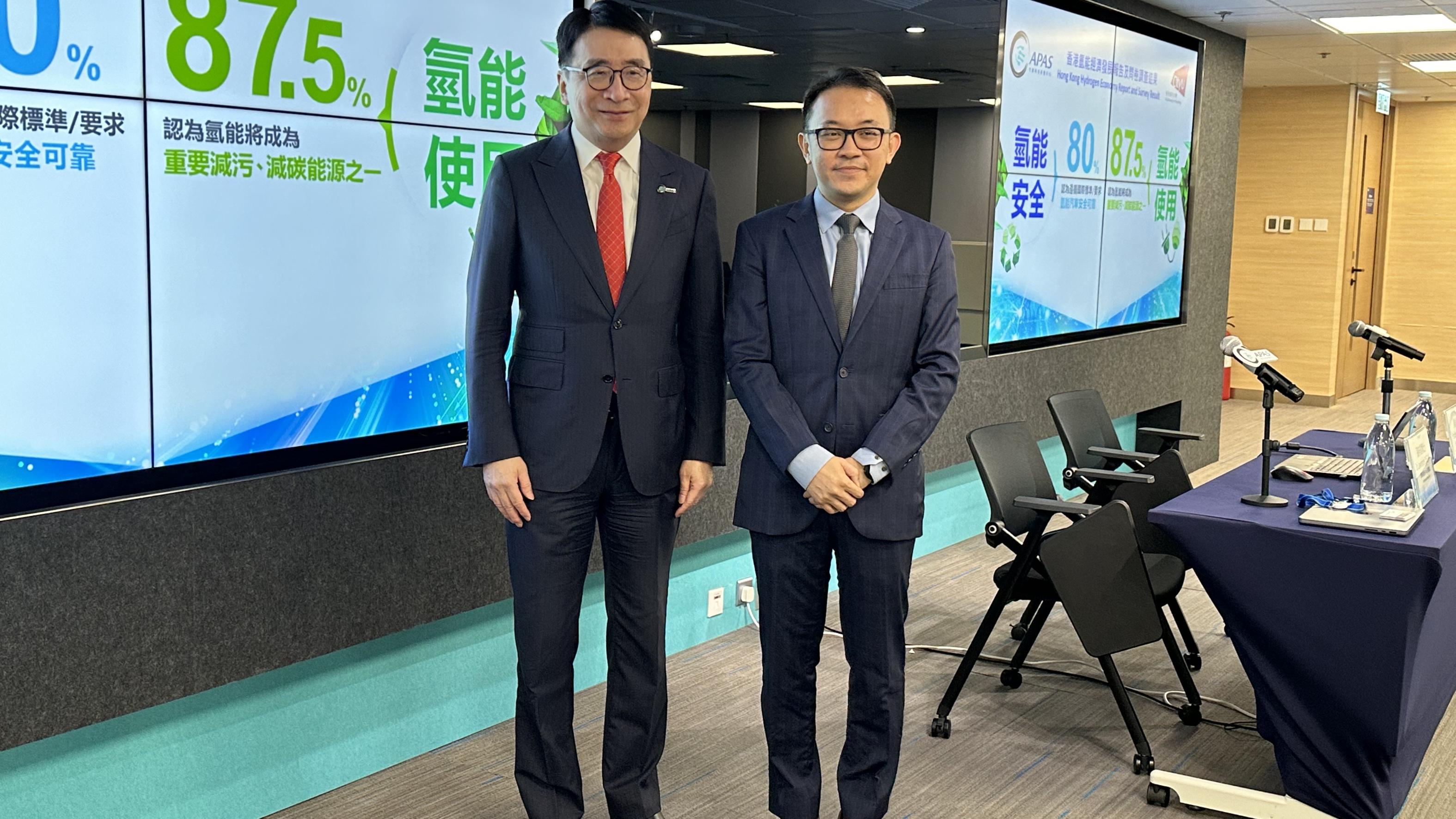 Lawrence Cheung Chi-chong (left), CEO of the Automotive Platforms and Application Systems R&D Centre, and Ng Yun-hau, professor of the School of Energy and Environment at the City University of Hong Kong, meet at the Hong Kong Productivity Council Building on Oct 13, 2023. (WILLIAM XU / CHINA DAILY)
Lawrence Cheung Chi-chong (left), CEO of the Automotive Platforms and Application Systems R&D Centre, and Ng Yun-hau, professor of the School of Energy and Environment at the City University of Hong Kong, meet at the Hong Kong Productivity Council Building on Oct 13, 2023. (WILLIAM XU / CHINA DAILY)
A recent survey found that stakeholders in Hong Kong’s transportation industry support a wider application of hydrogen energy in commercial vehicles, and nearly half of the survey’s respondents expressed their intention to run a hydrogen-related business.
Over 87 percent of the respondents agreed that hydrogen will be an important energy source for achieving carbon neutrality, while 47.8 percent of the stakeholders believe Hong Kong can collaborate with the Chinese mainland to boost the city’s hydrogen-industry development.
Over 80 percent of the respondents say that the use of hydrogen energy will be safe as long as there are appropriate standards and regulations, and 68.2 percent of respondents believe that hydrogen vehicles are not more dangerous than conventional or electric vehicles
The survey, jointly conducted by the Automotive Platforms and Application Systems R&D Centre (APAS) and the City University of Hong Kong (CityU), interviewed 88 stakeholders from the transportation industry from August to September, including transportation service operators, vehicle equipment manufacturers and gas-station owners.
READ MORE: Developing hydrogen energy industry with Hong Kong-mainland joint efforts
The survey is part of a comprehensive report on Hong Kong’s hydrogen economy, which lists Hong Kong’s priorities in developing hydrogen industries and other suggestions. The report was drafted by APAS and CityU.
At a media briefing on Friday, APAS CEO Lawrence Cheung Chi-chong said both the report and the survey aim to reflect stakeholders’ attitudes toward hydrogen energy and provide a reference for the government in policymaking.
Cheung said about 90 percent of respondents favor using hydrogen energy in transportation or using it to replace fossil fuels in some cases, such as power generation.
He said some transportation-business insiders are not satisfied with electric vehicles as they have a long charging time — often a few hours — which reduces the efficiency of commercial vehicles. They have an interest in hydrogen vehicles because their refilling process can be completed in a few minutes, or almost the same amount of time that conventional vehicles need for refueling, Cheung added.
Over 80 percent of the respondents say that the use of hydrogen energy will be safe as long as there are appropriate standards and regulations, and 68.2 percent of respondents believe that hydrogen vehicles are not more dangerous than conventional or electric vehicles.
The survey also found that the development of hydrogen energy in Hong Kong is hindered by its high price — over HK$100 ($12.78) per kilogram. Meanwhile, the average price of hydrogen on the mainland is 30 yuan ($3.83) per kg. Other obstacles include the absence of regulations and a refilling infrastructure.
However, the high cost of hydrogen energy has not dampened stakeholders’ enthusiasm. Fifty-five percent of the respondents said they can accept an up to 20 percent price difference when operating hydrogen-powered vehicles. Another 4.5 percent said they would embrace hydrogen vehicles no matter how high the price is.
Also at the news conference, Ng Yun-hau, professor of CityU’s School of Energy and Environment, said stakeholders care about the origin of hydrogen energy, and 40.9 percent of them said they believe Hong Kong is unlikely to produce enough hydrogen locally. About 62.5 percent of surveyed people said Hong Kong can import hydrogen from the Chinese mainland, while 42 percent said the city can also use hydrogen exported from Australia, Chile and South Africa.
Ng suggests that Hong Kong can start with the bonanza at hand — town gas. He said that 51 percent of town gas supplied to Hong Kong households is hydrogen. After being separated from gas, hydrogen can also be transported via the city’s existing gas pipeline network, he said.
READ MORE: Experts: China's hydrogen energy sector sees progress
Stakeholders also put forward their suggestion to the government in the survey, such as calling for the government to develop a clear and consistent regulatory framework, build more hydrogen infrastructure, and offer more fiscal incentives for society to use hydrogen energy.
Furthermore, 48.9 percent of the respondents expressed their intention to run a hydrogen-related business, mainly consultancy service providers, researchers and equipment suppliers.
The report, as well as the key findings of the survey, will be presented to the government soon for reference, Cheung said.


